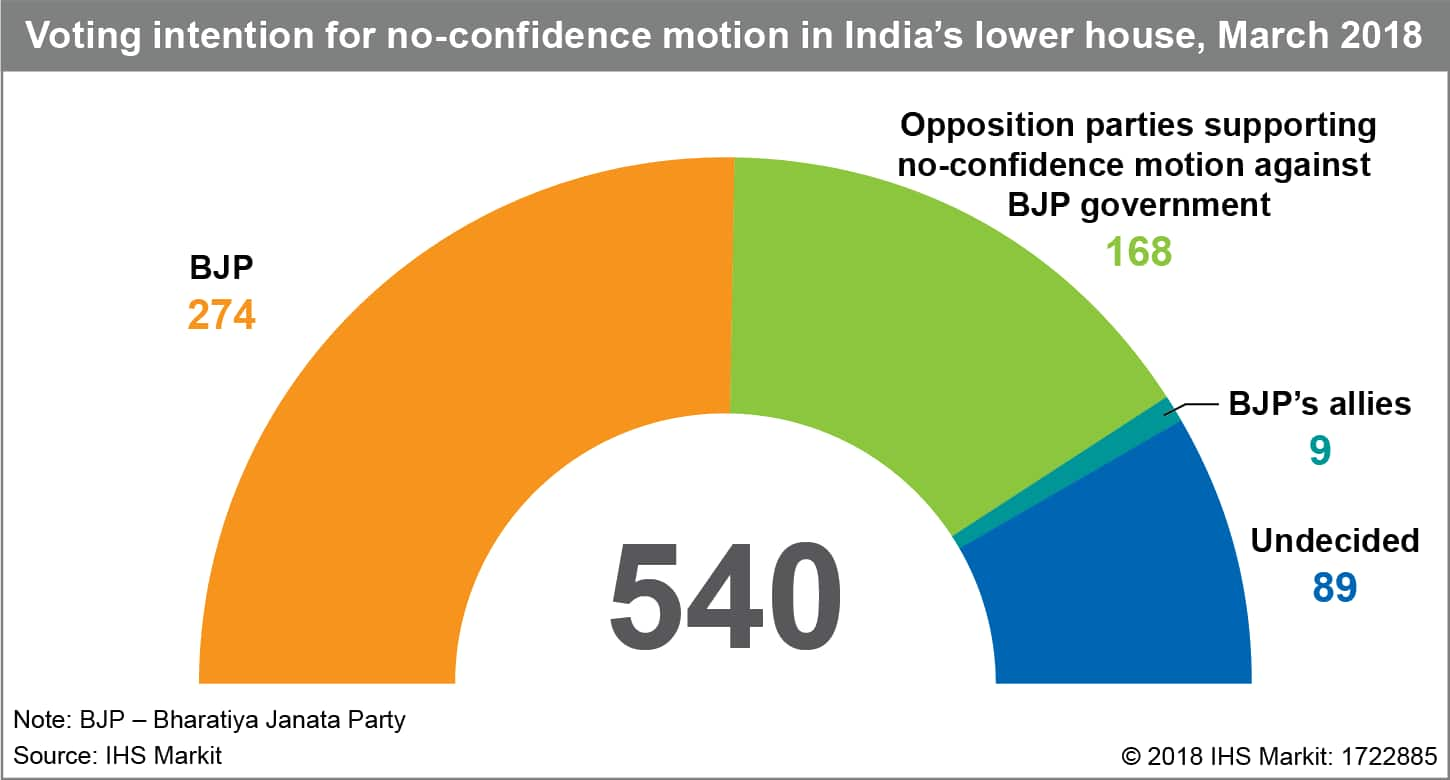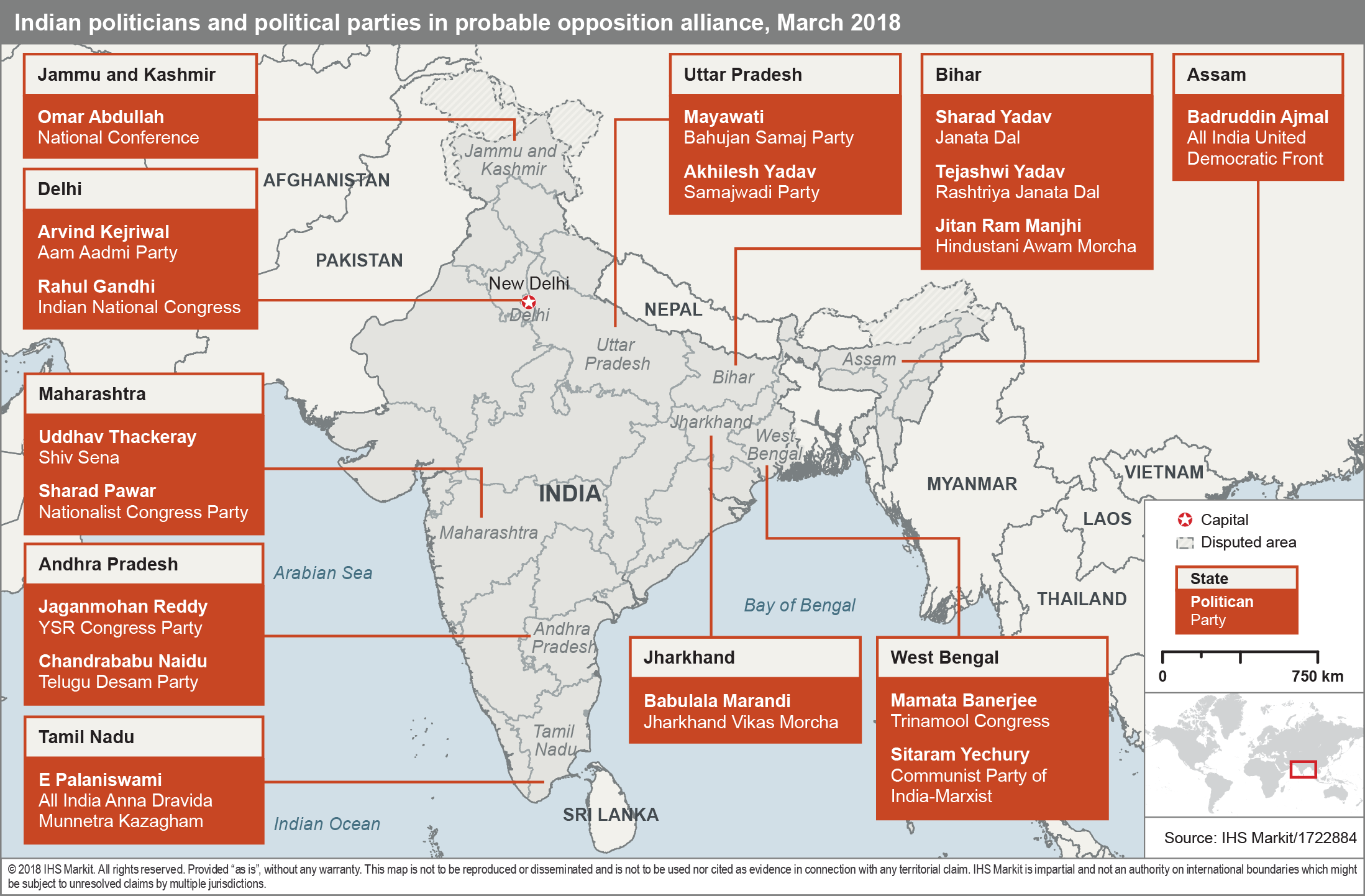Customer Logins
Obtain the data you need to make the most informed decisions by accessing our extensive portfolio of information, analytics, and expertise. Sign in to the product or service center of your choice.
Customer Logins
BLOG
Mar 23, 2018
India no-confidence motion
The firstno-confidence motion against India's Bharatiya Janata Party (BJP)-led government since it assumed power in 2014 has received support from nine political parties, which cumulatively control 168 of 540 seats in the lower house.
- On 15 March, the YSR Congress Party filed a no-confidence motion against the Indian government.
- The motion indicates a probable early election and the formation of an opposition alliance that will unite to contest the next election.
- Although the BJP is likely to retain power it will probably be more dependent on coalition support, which is likely to slow Prime Minister Narendra Modi's reform agenda during his second term.
On 15 March, the Yuvajana Shramika Rythu Congress Party (YSRCP), a regional political party from India's southern state of Andhra Pradesh, filed a no-confidence motion against the Bharatiya Janata Party (BJP)-led government in parliament's lower house. The YSRCP claimed that the government had reneged on its promise of offering special status to Andhra Pradesh in the 2018-19 budget, which would have secured greater financial contributions for the state from the central government.
The motion will be considered in the coming days (no later than 23 March). If such a move is tabled, the government is highly likely to survive; although a party within the governing coalition, Shiv Sena, is likely to support the motion against the government, the BJP independently holds a slim simple majority in the house.

Probable opposition alliance
Nonetheless, the move represents the first no-confidence motion against the BJP-led government since it assumed power in the 2014 general election. In India a no-confidence motion can be filed only in the lower house, and requires the support of at least 50 members of parliament (MPs) for a vote to be considered. Although the YSRCP has only nine MPs, the motion received official support from seven other regional parties and tacit support from Shiv Sena - despite that fact that some parties are rivals within their respective states - and included the main national opposition Indian National Congress (INC) party, bringing total support of 168 MPs.
Such unity indicates that an anti-BJP electoral alliance is increasingly likely to be formed ahead of the upcoming general election (currently scheduled for early 2019). This alliance is likely to contest elections together, and to focus efforts against the BJP instead of competing with one another. These eight parties represent regional interests of six major Indian states, including Andhra Pradesh, Delhi, Kerala, Tamil Nadu, Telangana, and West Bengal, alongside the INC's nationwide presence. The alliance is likely to expand to potentially include support from nine additional political parties representing the interests of six further states, including Assam, Bihar, Maharashtra, Jammu and Kashmir, Jharkhand, and Uttar Pradesh.
On 13 March, the INC's de-facto leader, Sonia Gandhi, hosted an informal dinner of 20 opposition parties to devise a common strategy against the BJP, indicating the INC's interest in leading a formal coalition against the ruling party. Although none of the parties aside from the INC maintain a significant cross-state presence, each regional party has the potential to win seats at the state level; combining seats across states to form a coalition could crucially limit the BJP's prospects of holding a majority seat share in the lower house. This likelihood is further increased by growing anti-incumbency sentiment against the BJP: since the previous general election, the party has lost six of eight by-elections held across the states of Gujarat, Madhya Pradesh, Punjab, Rajasthan, and Uttar Pradesh.
Early election, slower reforms
The potential opposition alliance increases the likelihood of Prime Minister Narendra Modi bringing forward India's general elections from early 2019 to late 2018 - to be conducted simultaneously with state assembly elections in Chhattisgarh, Madhya Pradesh, and Rajasthan - primarily as a strategy to limit the financial and political consolidation of the alliance. Furthermore, early and simultaneous elections are likely to arrest the anti-incumbency sentiment: according to an independent study conducted by the IDFC Institute, during previous simultaneously held elections in India, 77% of voters opted for the same party at the central and state levels and mostly favoured the party in central government.
The electoral alliance also indicates increased government and policy instability post-election. The alliance - representing various regional interests and including multiple politicians vying for leadership positions - is unlikely to remain stable, and its probable inability to devise a streamlined campaign will enable the BJP to form another government. However, the BJP will probably fail to re-establish an absolute majority, and will therefore be more reliant on coalition support. Coalition-dependent governments in India have often led to increased parliamentary disruption, and consequently to a slowdown in reforms.

Outlook and implications
The current BJP government has passed key legislation swiftly on the back of its legislative majority, but the party has a weaker record than the INC in building cross-party consensus. On 14 March, the BJP's majority enabled the government to pass the 2018-19 budget amid opposition protests, which would probably have delayed its passage.
A divided house is therefore highly likely to slow Modi's reform agenda. Proposed bills to simplify land acquisition for commercial purposes, to ease the hiring of contractual labourers, to strengthen anti-corruption legislation, and to raise the ceiling on foreign ownership in banks and electronics manufacturers are all likely to be delayed. A February 2018 IHS Markit Business Outlook Survey for India indicated weaker confidence among private-sector companies due to uncertainty in government policies in the one-year outlook.
State assembly elections in Karnataka scheduled for April 2018 will be a key risk indicator. Karnataka is the sole major state in which the INC still forms government; the party retaining power would increase the likelihood of early elections, as this would signal further opposition consolidation.
Sources have also indicated a growing internal rift within the BJP: in 2018 to date, the party has lost four lower house seats to opposition parties (specifically the INC and the Samajwadi Party) following by-elections in Rajasthan and Uttar Pradesh, primarily because its activist wing - the Rashtriya Swayamsevak Sangh - failed to campaign actively in Rajasthan and Yogi Adityanath, a BJP chief minister of Uttar Pradesh, did not campaign actively for his previously held seat in that state. A deepening of this intraparty division would further reduce the likelihood of BJP establishing a majority government alone.
{"items" : [
{"name":"share","enabled":true,"desc":"<strong>Share</strong>","mobdesc":"Share","options":[ {"name":"facebook","url":"https://www.facebook.com/sharer.php?u=http%3a%2f%2fstage.www.spglobal.com%2fmarketintelligence%2fen%2fmi%2fresearch-analysis%2findia-noconfidence-motion.html","enabled":true},{"name":"twitter","url":"https://twitter.com/intent/tweet?url=http%3a%2f%2fstage.www.spglobal.com%2fmarketintelligence%2fen%2fmi%2fresearch-analysis%2findia-noconfidence-motion.html&text=India+no-confidence+motion+%7c+S%26P+Global+","enabled":true},{"name":"linkedin","url":"https://www.linkedin.com/sharing/share-offsite/?url=http%3a%2f%2fstage.www.spglobal.com%2fmarketintelligence%2fen%2fmi%2fresearch-analysis%2findia-noconfidence-motion.html","enabled":true},{"name":"email","url":"?subject=India no-confidence motion | S&P Global &body=http%3a%2f%2fstage.www.spglobal.com%2fmarketintelligence%2fen%2fmi%2fresearch-analysis%2findia-noconfidence-motion.html","enabled":true},{"name":"whatsapp","url":"https://api.whatsapp.com/send?text=India+no-confidence+motion+%7c+S%26P+Global+ http%3a%2f%2fstage.www.spglobal.com%2fmarketintelligence%2fen%2fmi%2fresearch-analysis%2findia-noconfidence-motion.html","enabled":true}]}, {"name":"rtt","enabled":true,"mobdesc":"Top"}
]}





